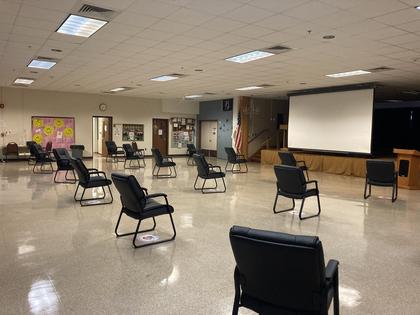Serving the elderly in a pandemic: These senior centers vary between Zoom and in-person classes
Published in Senior Living Features
HARTFORD, Conn. — For the first time since March, older residents of New Britain, Middletown, Enfield and Southington have been going into their senior centers this fall for stretching sessions or fitness classes.
Capacities are severely limited, appointments and face masks are mandatory, gatherings beforehand or afterward are prohibited, and lunches must be taken to go — the dining rooms remain closed.
But even with the restrictions, those communities are offering more access than many others in central Connecticut. Avon, West Hartford, Glastonbury, Canton, Cromwell, Burlington and Simsbury are among those where the senior centers are closed to routine programming, although a few offer flu clinics, one-one-one social services counseling or health screenings.
"We haven't been able to have the seniors back in the building for any recreational-type activities. We had plans to open in November, but we're on hold now because of the uptick in the virus," said Patricia Tomascak, director of Bristol's senior center.
In every community, senior center managers have been talking with health officials and town leaders since March about what's safe and what's risky.
All senior centers shut their doors when the pandemic began; classes were offered on YouTube or through Zoom, and meals were provided either through outdoor pickup or by dropoff at the seniors' homes. When the state allowed limited reopening in September, though, each town made its own decision on what to do.
The layout of the buildings often made the difference: Centers with big, well-ventilated spaces were far easier to put back into service. Older buildings with poor ventilation, small rooms and insufficient space for social distancing posed a challenge.
"Every town is different and every senior center is different — there are many critical things to think about," Tomascak said.
Centers that haven't reopened are trying to do weekly phone checks on their members, organizing pen pal writing campaigns and trying other innovations to reduce the risk of severe isolation.
New Britain was among the first to partially reopen, and Transportation Coordinator Julie Swan said the reception was good.
"People were very excited. They were just overall happy and excited to be out of their house," Swan said. "They'd been locked up for seven months, so coming in just to play a game with their friends was important — especially the ones who don't have family or other people close by."
The center's most popular activity, daily lunch in the main dining room, isn't possible under state regulations. Seniors can't simply drop in when they like; appointments are mandatory. And unlike the way things used to be, seniors who sign up for a morning activity and another in the afternoon must leave the building in between.
In Plainville, where the senior center began a gradual reopening this month, members were told ahead of time to beware of overly cheery expectations.
"Although it won't be the same senior center you left on March 17, we are excited to offer opportunities for people to see each other and have fun," according to its newsletter. "Our population is still the most at-risk group for contracting COVID-19 and complications arising out of being infected. Safety, for our members and our staff, will remain our highest priority. It is not only our biggest concern; it is our responsibility."
And much like the rest of the population, seniors aren't all responding the same way even when there's a limited reopening. A segment of New Britain's elderly, for instance, isn't ready to go back, Director Rex Cone said.
"It's a mixed bag. The seniors who are more at risk haven't been coming, or they're just picking up lunch and avoiding people as much as they could. Others are a little more optimistic," Cone said. "They follow all the guidelines, but they're looking to be active and trying to live as normally as possible."
Middletown is offering exercise classes, chair yoga, billiards and more, but only with advance registration, and Windsor provides a coffee social hour on Tuesday and Friday mornings, a craft hour and limited-attendance bingo.
Simsbury is running nearly all activities online, and even set up a Veterans Day coffee hour on Zoom for veterans. Hearing and blood pressure clinics, foot care and other medical needs are provided in person.
Similarly, Wethersfield seniors can take classes ranging from photography to belly dancing online; the center itself, though, is open only for essentials such as medical clinics and one-on-one legal consultations. Coronavirus restrictions continue to make it impossible to offer weekly senior haircut sessions.
Enrollment in any in-person activities remains sharply limited — even in the case of a class held in a large room.
"Our dining room capacity is 130 to 140 — right now with social distancing, it's 18," Tomascak said of Bristol's senior center. "Some of our classes that used to have 15 to 24 people, now it's four. It's very, very challenging."
___
(c)2020 The Hartford Courant (Hartford, Conn.)
Distributed by Tribune Content Agency, LLC
_____
TO SUBSCRIBE TO 50-PLUS







Comments